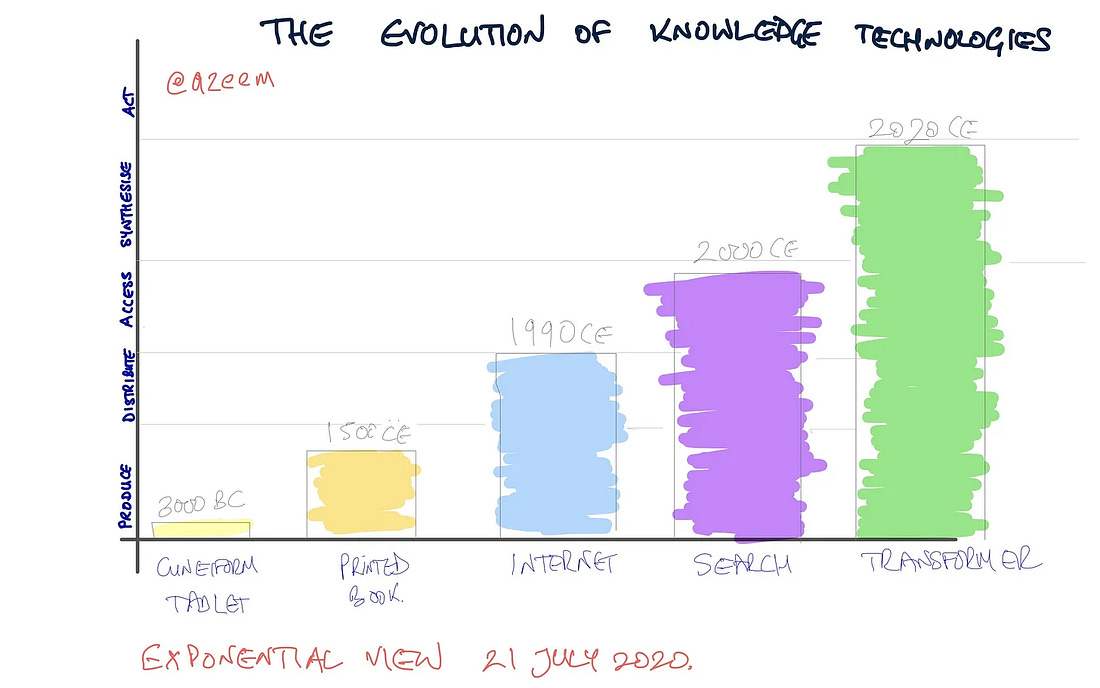🔮 Sunday edition #523: AI in 2030; the future of education; generative biology; AI moats++
🔮 Sunday edition #523: AI in 2030; the future of education; generative biology; AI moats++An insider’s guide to AI and exponential technologiesHi, it’s Azeem. OpenAI’s $3 billion acquisition of Windsurf isn’t about code assistants – it’s about controlling the critical feedback cycle where humans evaluate AI outputs. Meanwhile, the search paradigm is crumbling as Google searches in Safari declined for the first time in 22 years, with users flocking to conversational AI tools. The message is clear: in 2025, owning the feedback loop confers strategic advantage. Let’s dive in! Today’s edition is brought to you by our sponsor, Eleven Labs – the complete AI Audio Developer platform. Build low-latency AI voice agents that sound human and can handle unpredictable conversations in the noisiest environments. Get started free. AI in 2030What does a world with AI look like in 2030? What does your daily life look like in 2030? In this week’s member commentary, I explore what a near-term future of improving AI may mean in our day-to-day.
Cheat code educationFollowing up on our commentary of last week when we highlighted that judgement is the key bottleneck to talent moving upward in the age of AI, this week we turn to a common belief that LLM-assisted “cheating” is an existential threat to schooling. A more honest framing of this issue is – the trend of using LLMs to “cheat” is actually a mirror held up to an assessment regime that was already cracked. It is a deadline screaming at our outdated ways of learning. Anthropic’s read of two million Claude chats shows students lean on AI to create (39.8%) and analyze (30.2%) while almost half the time they simply ask for the answer. Far from worsening students skills, a new paper in Nature, confirms “the positive impacts of ChatGPT on learning performance, learning perception, and higher-order thinking.” The effects measured in this meta-analysis are surprisingly positive. The researchers conclude that when used appropriately, within well-scaffolded, problem-focused courses, chatbots can boost learning outcomes. Feedback is the moatStartups win not by having a moat, but by continuously moating – compounding advantages in a loop faster than anyone else. That’s why OpenAI just paid $3 billion for Windsurf: not to sell more coding assistants, but to control the loop where developers give real feedback on AI-generated code. Windsurf routes user prompts through rival models as well as GPT-4o, then attaches satisfaction scores and follow-up actions. Whoever controls that loop gets the metadata moat that matters – how humans actually debug, refactor and accept suggestions. It’s a reminder of the virtuous cycle Jensen Huang calls “Moore’s law squared”: better models beget better tools, which create better data, which train better models. In that flywheel, inference revenue is secondary. What counts is compounding advantage – and buying a product that sits at the moment of user delight (or frustration) is the cheapest way to pour accelerant on the loop. Meta is enforcing a moat of a different kind – around your emotional state. On Instagram, Facebook and WhatsApp, LLM-powered bots now offer romantic role-play. It’s sold as mental health support, but the business model is in intention harvesting. In this feedback loop, the product is your confession. And then there’s Google, on the defensive. Google searches in Safari fell for the first time in 22 years. Alphabet lost $250 billion in market cap. Users are switching to AI-native tools like ChatGPT and Perplexity. I called this in 2020: transformers mark the shift from cuneiform → printing press → web → search → post-search. In a world where knowledge starts with a conversation, who wants to spelunk through SEO rubble? I’d rather ask o3 and get a synthesized answer. The antitrust trials might decide if Google stays whole. But the user migration already decided something more important: Google no longer owns the feedback loop. The default box in the browser bar has lost its monopoly on curiosity and now it has to earn every single query. See also:
Elsewhere
Thanks for reading! Today’s edition is sponsored by Eleven Labs. ElevenLabs is powering human-like voice agents for customer support, scheduling, education and gaming. With server & client side tools, knowledge bases, dynamic agent instantiation and overrides, plus built-in monitoring, it’s the fastest way to launch conversational experiences. Get started free. Sponsor Exponential ViewYou're currently a free subscriber to Exponential View. For the full experience, upgrade your subscription. |
Similar newsletters
There are other similar shared emails that you might be interested in:




